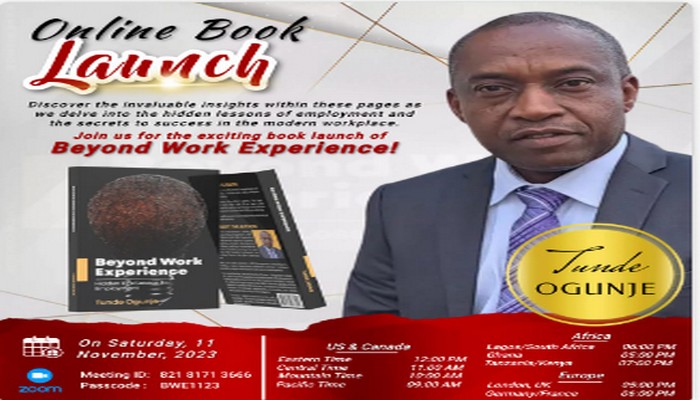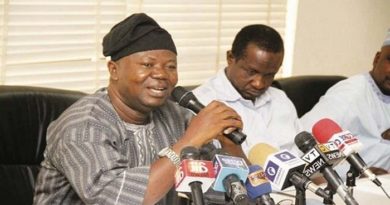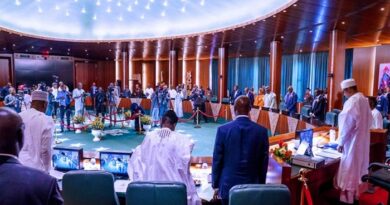Tunde Ogunje unveils Beyond Work Experience: Hidden Life Lessons in Employment
BEYOND WORK EXPERIENCE: HIDDEN LIFE LESSONS IN EMPLOYMENT, a book by a seasoned investment expert and Chattered Accountant of repute Mr. Tunde Ogunje is to be launched on Saturday, November 11th, 2023.
In the invitee, the author wrote “Dear sir/ma. I trust this message finds you well. This is to officially invite you to the virtual launch of my book, “BEYOND WORK EXPERIENCE: HIDDEN LIFE LESSONS IN EMPLOYMENT” .I am really very glad and thankful to God to be witnessing the fulfillment of this life ambition. I am counting on friends, brothers, sisters, and mentors like yourself to make the event successful.
Summary of the book
“Beyond work experience” is a non-fictional book authored by Tunde Ogunje as a collection of real-life workplace events. It is written with the intention to help different categories of people: employees at different stages in their work life, employers of labor who would be interested in forming a complete life relationship with employees beyond the workplace, and many others that can apply the life lessons in the book to different situations of life that may require critical thinking, focus on set goals, and analytical decision making.
The book has eight chapters, called lessons. To buttress the points and drive the lessons home, each of these chapters has stories about the author in various real-life events during his career. In truth, there are many lessons hidden in each of the chapters and it will take a careful read to be able to unearth the carefully crafted lessons.
The first lesson of the book encourages the reader to consider everything at stake and critically analyze how the final decision affects overall goal in life. He says that the emphasis must be on the bigger picture rather than on what is appealing to satisfy immediate need, and that the decision must be about the person in the situation, rather than serving the dictates of others.
Chapter two strongly advises that we cannot afford to be unnecessarily emotional about our jobs. There could be many good reasons to leave a job, and it’s appropriate to leave once it becomes clear that that is the best course of action. Why? Employment is not marriage; and we must understand that power resides with the employer and that we are only hired or retained because the boss, for many reasons, cannot fulfill the expectations of the role we occupy.
Chapter admonishes that we must be careful not to sacrifice the future because of present needs. When it becomes necessary, it’s wise to vote for the future against the present, to prioritize the future above and ahead of the present because there are consequences for every choice we make, and our today is the product of the actions and inactions of yesterday.
Integrity as a virtue is the focus of chapter four. The author makes the point that there is no better place to display integrity than in the workplace. Playing by the rules, showing up when we should, strengthening the system rather than finding loopholes to be exploited, avoiding private benefits in the process of discharging responsibilities at work are some of the ways the author encourages readers to operate in integrity because we do not have to bend the rules to be successful. We can win by righteousness!
Chapter five advises that we should respect our bosses but shouldn’t fear them. The author makes the point that many bosses don’t really care about the employees fearing them, they just want us to deliver and advance the cause of the organization. Respect rather than will get the employee lots of respect from the employers. The point the author makes is that you are not inferior to the employer, and you should resist any attempt to make you look inferior.
In the sixth chapter, the author appeals to his readers to always flip the coin and put themselves in the shoes of the employer and try to be objective when complaining about the employer. He believes that many people will do exactly what they whine about. So he says his readers should think like the owner of the business, empathize with them and accept some of their corrections without grumbling.
While many people believe in playing office politics to survive in the workplace, the author thinks otherwise. In chapter seven, he preaches that there is only a little that we can achieve when we depend on favours from the bosses. Rather he stresses that we should use all our God-given gifts to develop solutions to problems and approach our work with the professionalism it deserves. He strongly affirms that we can’t go too far without a strong foundation for any advancement we procure. He also enjoins leaders to learn how to recognize intelligence and hard work in the workplace and develop a system to reward those good virtues appropriately and adequately.
The message in chapter eight is clear and simple: in order to avoid frustration, we all must be truthful to ourselves as to what our strength is. We should avoid the tendency to build castles in the air or run around because of what others are doing. In summary, he advises his readers to avoid what he calls the “me too” syndrome where we want to prove a point that we can also do what our contemporaries are doing.
Finally, there is an excerpt from what people are saying about this book that really defines how robust this book is. It says “Indeed, there are more than eight hidden lessons to learn in this book. Rather numerous lessons that span not just workplace experiences but other facets of life such as family, faith and relationships management.
This book is useful for anyone and everyone. There will be a lesson or two about life that we all can learn.
What others are saying about the book
Reading the book was like having a conversation with a supportive mentor, encouraging me to be true to myself, break through the noise and discover what the best path is for me. It helped me gain important perspective about where my motivation and priorities should be when it comes to work, and how to avoid common pitfalls. Many chapters outlined practical considerations I wish I’d learned earlier in my career. I learned lessons from Tunde’s employment journey that I can employ in my own professional development.
Berkley Ridenhour,
Program Management Professional
Moscow, Idaho. USA
“BEYOND WORK EXPERIENCE” is a resonant walk through the intricate tapestry of employment and its intertwined life lessons. Reading it was like a heartfelt revisit to many pivotal moments in my own professional journey, both triumphant and challenging. Tunde masterfully captures the nuances of the workplace and its impact on our larger existence, especially in the wake of recent global events. The pandemic, for many, was an introspective period, prompting us to reflect on life’s purpose and meaning. Tunde’s portrayal is poignant, drawing connections between spirituality, well-being, education, and professional evolution. This book is not merely about navigating the workplace; it’s about understanding its place in our holistic development. It’s a must-read for young individuals on the cusp of their careers, offering them a compass to navigate the uncharted waters of professional life.
Congratulations, Tunde, for crafting such a compelling narrative. Your insights are invaluable.
Anju De Alwis FCMA (UK), CGMA, CIM (UK), MBA (UK), CPA (Australia)
Managing Director, Ultimate Access Education
Dubai, United Arabs Emirates
Beyond Work Experience: Hidden life lessons in employment – is holistic in nature. It is an important and fundamental life navigation device, resource, tool, process and system for achieving a purpose-filled, purpose-led and purpose- run life and career.
This book unearthed the hidden but simple and wise secrets and lessons to success and delivers the whole truth to achieving a holistic successful life of your choice.
I emphatically recommend this book to anyone that is serious and wants to get the best out of their being and enjoy unhindered abundant life. This is the next book you need after the Holy Bible. Another person observed.




